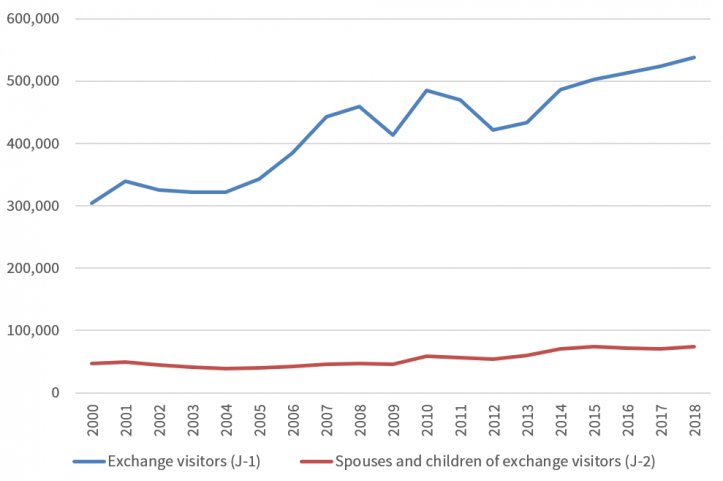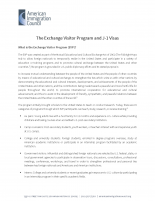- Fact Sheet
The Exchange Visitor Program and J-1 Visas
Published
What is the Exchange Visitor Program (EVP)?
The EVP was created as part of the Mutual Educational and Cultural Exchange Act of 1961 (The Fulbright-Hays Act) to allow foreign nationals to temporarily reside in the United States and participate in a variety of education or training programs and to promote cultural exchange between the United States and other countries. The program is grounded in U.S. public diplomacy efforts and its stated purpose is:
to increase mutual understanding between the people of the United States and the people of other countries by means of educational and cultural exchange; to strengthen the ties which unite us with other nations by demonstrating the educational and cultural interests, developments, and achievements of the people of the United States and other nations, and the contributions being made toward a peaceful and more fruitful life for people throughout the world; to promote international cooperation for educational and cultural advancement; and thus to assist in the development of friendly, sympathetic, and peaceful relations between the United States and the other countries of the world.
The program initially brought scholars to the United States to teach or conduct research. Today, there are 15 categories of programs through which EVP participants can teach, study, research, or receive training:
- Au pairs: Young adults live with a host family for 12 months and experience U.S. culture while providing childcare and taking courses at an accredited U.S. post-secondary institution.
- Camp counselors: Post-secondary students, youth workers, or teachers interact with and supervise youth at U.S. camps.
- College and university students: Foreign students, enrolled in degree programs overseas, study at American academic institutions or participate in an internship program facilitated by an academic institution.
- Government visitors: Influential and distinguished foreign nationals are selected by U.S. federal, state, or local government agencies to participate in observation tours, discussions, consultations, professional meetings, conferences, workshops, and travel in order to strengthen professional and personal ties between key foreign nationals and Americans and American institutions.
- Interns: College and university students or recent graduates gain exposure to U.S. culture by participating in an internship program in their specific academic fields.
- International visitors: Foreign leaders are selected by the Department of State to participate in programs designed to enable the international visitors to better understand American culture and society and enhance American knowledge of foreign cultures.
- Physicians: Foreign doctors participate in U.S. graduate medical education programs or training at accredited U.S. schools of medicine.
- Professors and research scholars: These two programs promote the exchange of ideas, research, and linkages between research and academic institutions in the United States and abroad.
- Secondary school students: Foreign high-school students study at an accredited public or private high school and live with an American host family or at an accredited boarding school.
- Short-term scholars: Professors, scholars, and other accomplished individuals travel for a short time across the United States to lecture, observe, consult, train, or demonstrate special skills at research and academic institutions, museums, and libraries.
- Specialists: Experts in their field exchange ideas with their American counterparts.
- Summer work travel program: University and college students work and travel in the United States during the summer.
- Teachers: Foreign educators teach full-time at a primary or secondary school in K-12 classrooms in the United States.
- Trainees: Foreign professionals with a degree, professional certificate, or relevant work experience gain exposure to U.S. culture and receive training in U.S. business practices through a structured and guided work-based program.
- Regional and special initiatives.
The EVP promotes cultural exchange and engagement with visitors from specific countries or regions of the world. For example, in March 2015, the United States entered into a new initiative with Mexico—the Mexican Intern Exchange Program—which allows interns from Mexico to come to the United States through EVP and U.S. interns to go to Mexico. In recent years, pilot exchange programs have been initiated with countries including Australia, New Zealand, Belarus, Bulgaria, Moldova, Romania, Russia, and the Ukraine. Investing in cultural exchange extends beyond specific nation-state relationships, intersecting with broader cultural, linguistic, and religious affiliations. In 2004, Congress declared that ‘‘the United States should commit to a long-term and sustainable investment in promoting engagement with people of all levels of society in countries with predominantly Muslim populations, particularly with youth and those who influence youth’’ through cultural exchange programs.
What is the J-1 Visa?
A J-1 is a temporary, nonimmigrant visa issued to an exchange visitor. There is no statutory cap on the number of J-1 visas available annually, but each year the Department of State allocates a pre-set number of Certificates of Eligibility (Form DS-2019) to program sponsors (see below) to issue to potential participants in exchange visitor programs across the country. This certificate, together with other necessary Department of State documents, permits the potential exchange visitors and their dependents to schedule an interview at a U.S. embassy or consulate to apply for a J visa to enter the United States.
For the past decade, the number of exchange visitors admitted to the United States annually has been approximately 500,000 (Figure 1). Currently, J-1 exchange visitors come from more than 200 countries and territories; 86 percent are younger than 30, and 53 percent are female.
The J visa is governed by specific regulatory requirements. For example:
- The duration of stay is determined by the specific EVP category and the school, employer, or other entity hosting the exchange visitor. For example, interns may remain in the United States for up to 12 months, and trainees may remain for up to 18 months. The host organization providing the internship or training determines whether the visitor will remain for the maximum or for some shorter period of time.
- J-1 visa holders who enter the United States on a work-based program (as a researcher, teacher, nanny, etc.) may apply for a Social Security number (SSN). They must pay taxes on any compensation they receive, but are exempt from paying Federal Insurance Contributions Act (FICA) taxes (for Medicare and Social Security).
- J-1 visas cannot be used for ordinary employment. EVP programs that have a work component are intended to provide bona fide training and experience for the exchange visitors and are not to supplant other workers.
- The spouse and unmarried children under age 21 may apply for J-2 visas as dependents of the J-1 visa holder. Dependents on J-2 visas are eligible to apply for work authorization after their arrival in the United States.
- J-1 visa holders must obtain insurance to cover sickness and accidents. The insurance must cover them and all J-2 dependents for the entire period of J-1 status in the United States.
- Because the underlying purpose of the J-1 exchange visitor category is to share experiences and ideas in the home country, J-1 visa recipients must come to the United States intending to depart when they complete the program. However, some exchange visitors may be eligible to live and work in the United States after their exchange program ends, depending on their own unique circumstances.
- Certain J-1 visa holders—for example, those with skills deemed necessary to the development of the home country—will be ineligible to receive certain other nonimmigrant visas or to become a lawful permanent resident (receive a green card) until they return to their home country for a total of two years following completion of their program (home residency requirement). The Department of State imposes the same requirements on J-2 visa holders as the J-1 visa holder.
- This home residency requirement may be waived in certain circumstances. For example, exchange visitors who can demonstrate their departure would cause exceptional hardship to U.S. citizen or legal permanent resident dependents may request a waiver.
Figure 1: J-1 and J-2 Visa Admissions, FY 2000

How is the Exchange Visitor Program administered?
The U.S. Department of State, Bureau of Educational and Cultural Affairs, administers the EVP in partnership with host organizations and sponsors. The Departments of State and Homeland Security are responsible for monitoring compliance with the program.
A host organization is a school, business, camp, or other entity in the United States that provides the actual internship, training, or education program in which the exchange visitor participates. Hosts must show they have appropriate facilities, equipment, and personnel to provide the exchange experience. Hosts providing employment, an internship, or training experience must show that they will not engage the J-1 visitor in ordinary employment and will not use a J-1 visitor to fill a position for which a U.S. worker could have been hired. Host organizations with fewer than 25 employees or less than $3 million in gross annual revenue are subject to a site visit before they may host an exchange visitor for the first time.
Sponsors are designated by the Secretary of State to conduct an exchange visitor program. Sponsors may be government agencies, academic institutions, educational and cultural organizations, or certain types of businesses or non-profits. In some cases, the sponsors are also the hosts. However, in most cases, sponsors are third parties that work with the hosts, the Department of State, and the exchange visitors to administer an exchange visitor program and provide the necessary Certificate of Eligibility (DS-2019) to apply for the J visa. There are more than 1,500 designated sponsors that participate in the EVP program.
Sponsors are generally designated to administer a specific category of exchange program. For example, the American Immigration Council is designated by the U.S. Department of State to sponsor J-1 intern and trainee programs.
Sponsors are responsible for:
- Screening prospective hosts, which may require a site visit.
- Screening prospective exchange visitors to ensure that they are eligible for the program. Exchange visitors must meet all requirements, including being sufficiently proficient in English.
- Helping J-1 visa applicants submit the required application materials, including detailed information about the host and exchange program plan, and any required fees to the Department of State.
- Providing orientation on life and customs in the United States prior to visitors’ arrival and ensuring that exchange visitors have clear information and materials about the requirements of their visa and all other procedures and rules that will be useful while they reside in the United States.
- Monitoring exchange visitors’ participation in the exchange program and entering relevant data (name, address, and arrival and departure date) in the Student and Exchange Visitor Information System (SEVIS), which enables schools and program sponsors to transmit information and notifications electronically to the Departments of Homeland Security and State throughout an exchange visitor’s stay in the United States.
Sponsors who fail to comply with the requirements of the EVP can be penalized, and their designation can be suspended, or revoked.
Help us fight for immigration justice!
The research is clear – immigrants are more likely to win their cases with a lawyer by their side. But very few can get attorneys.
Introducing the Immigration Justice Campaign Access Fund.
Your support sends attorneys, provides interpreters, and delivers justice.

Immigration Justice Campaign is an initiative of American Immigration Council and American Immigration Lawyers Association. The mission is to increase free legal services for immigrants navigating our complicated immigration system and leverage the voices and experiences of those most directly impacted by our country’s immigration policies to inform legal and advocacy strategies. We bring together a broad network of volunteers who provide legal assistance and advocate for due process for immigrants with a humane approach that includes universal legal representation and other community-based support for individuals during their immigration cases.

